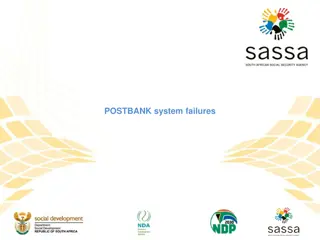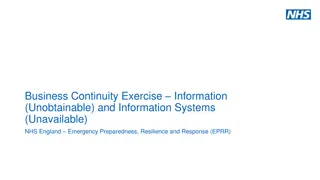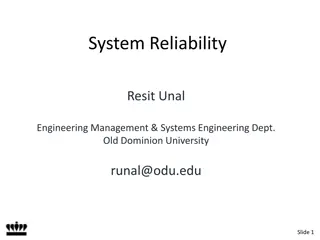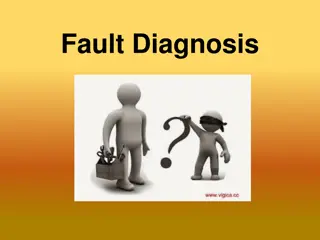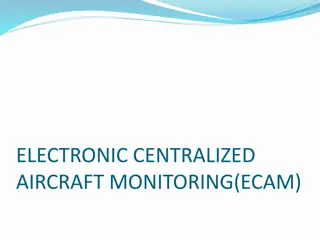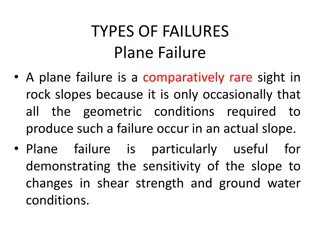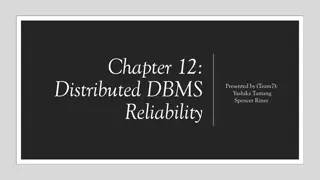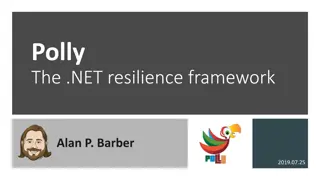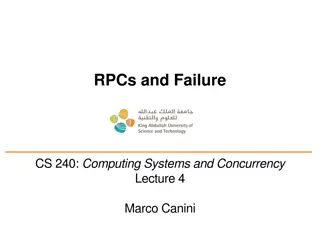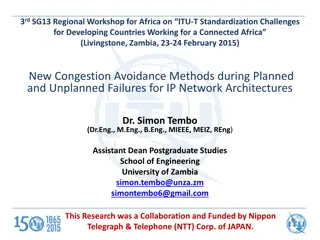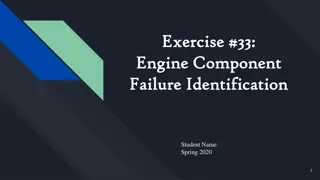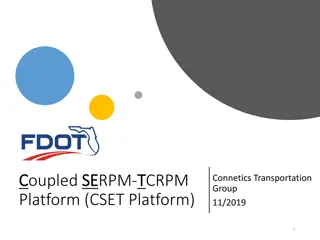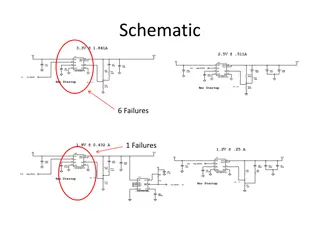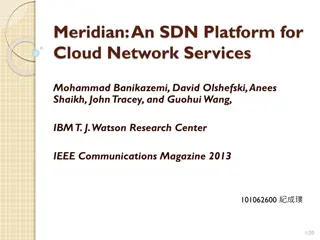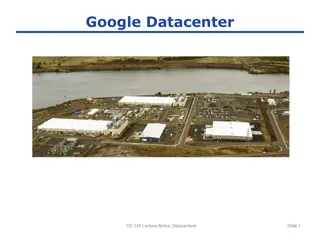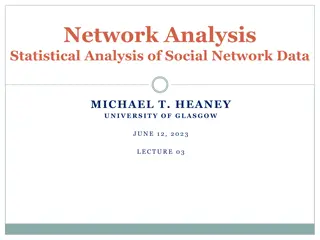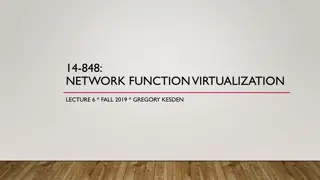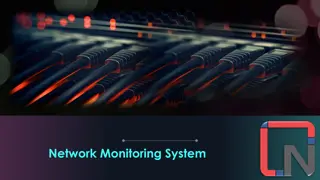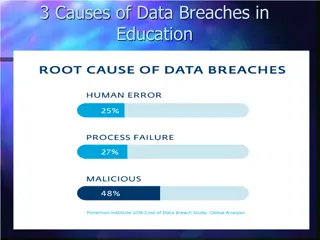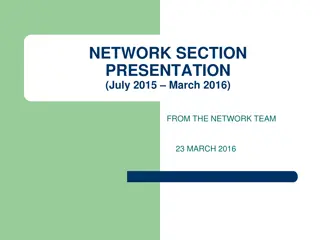Main Failures Faced by the Reserve Bank of India
The Reserve Bank of India has encountered several challenges including lack of adjustment in the money market, absence of uniformity in interest rates, inadequate bill market development, insufficiency of agricultural credit availability, lack of banking facilities in rural areas, and instability in
2 views • 11 slides
Update on Postbank System Failures and Challenges in Social Grant Payments
The presentation outlines the recent system failures experienced by Postbank, affecting social grant payments. Funds were deducted from accounts but not reverted after failed withdrawals. Postbank has corrected most accounts manually, but some beneficiaries may still need assistance. Challenges incl
0 views • 8 slides
Understanding Over-Pressurized Filters in Jeep Reverse Plug and Kia/Hyundai Engine Recall
Learn about the risks of over-pressurized filters in Jeep Reverse Plug systems and the significant Kia/Hyundai engine recall affecting millions of vehicles due to potential engine failures. Explore the connection between oil pressure issues, engine machining errors, and the importance of using compa
3 views • 14 slides
Business Continuity Exercise Information and NHS England Emergency Preparedness
The content focuses on a business continuity exercise related to NHS England Emergency Preparedness, emphasizing the importance of evaluating and enhancing business continuity plans. It covers elements of business continuity management, exercise objectives, ground rules, scenario background, and res
3 views • 16 slides
Modeling and Generation of Realistic Network Activity Using Non-Negative Matrix Factorization
The GHOST project focuses on the challenges of modeling, analyzing, and generating patterns of network activity. By utilizing Non-Negative Matrix Factorization (NMF), realistic network activity patterns can be created and injected into live wireless networks. Understanding and predicting user behavi
4 views • 28 slides
Overview of Distributed Systems: Characteristics, Classification, Computation, Communication, and Fault Models
Characterizing Distributed Systems: Multiple autonomous computers with CPUs, memory, storage, and I/O paths, interconnected geographically, shared state, global invariants. Classifying Distributed Systems: Based on synchrony, communication medium, fault models like crash and Byzantine failures. Comp
9 views • 126 slides
Understanding Electromigration Effects in IC Interconnect Lines
Background: As IC circuits advance, preventing failures like electromigration is crucial. Vacancies lead to potential failures in metal interconnects by causing macroscopic voids and hillocks. Explore the governing equations and physics interfaces behind the migration of vacancies in IC circuits. Im
0 views • 14 slides
Overcoming Failures: A Christian Perspective on Dealing with Setbacks
Discover how Christians can navigate failures by seeking repentance, accepting consequences, and pressing forward with faith. Learn from biblical examples like Judas, Peter, and Paul to embrace growth through failure and never give up in the face of challenges.
0 views • 18 slides
Understanding System Reliability in Engineering
System Reliability in Science/Engineering involves understanding how products/systems work, as well as the ways they fail and the effects of failures. Reliability is the probability that a system will perform as expected under given conditions and play a crucial role in the design phase to mitigate
0 views • 19 slides
Understanding Fault Diagnosis in Mechanical and Electrical Systems
Explore the essential methods and techniques for fault diagnosis in mechanical and electrical systems in industrial settings. Learn to identify different types of faults, utilize fault-finding aids, and rectify issues promptly to prevent future failures. Discover industry-recognized fault diagnosing
2 views • 27 slides
Understanding Electronic Centralized Aircraft Monitoring (ECAM) Systems
Electronic Centralized Aircraft Monitoring (ECAM) is a vital system that collects data from sensors throughout the aircraft, processes it, and displays key information to pilots efficiently. The system is composed of various components like System Data Acquisition Concentrators (SDACs), Flight Warni
0 views • 6 slides
Network Compression Techniques: Overview and Practical Issues
Various network compression techniques such as network pruning, knowledge distillation, and parameter quantization are discussed in this content. The importance of pruning redundant weights and neurons in over-parameterized networks is highlighted. Practical issues like weight pruning and neuron pru
0 views • 37 slides
Understanding Plane Failures in Rock Slopes
Plane failures in rock slopes are rare but significant, indicating sensitivity to changes in shear strength and groundwater conditions. Geometrical conditions must be met for such failures to occur, including specific alignments and interactions between the sliding plane and slope face. Analysis inv
0 views • 22 slides
Network Slicing with OAI 5G CN Workshop Overview
Overview of Network Slicing with OAI 5G CN workshop focusing on the crucial role of network slicing in realizing the service-oriented 5G vision. This workshop covers topics like multiple logical networks creation on shared infrastructure, different types of network slices, preparation and instantiat
1 views • 6 slides
Understanding Wedge Failures in Geotechnical Engineering
Wedge failures in geotechnical engineering occur when slopes with discontinuities experience sliding along the line of intersection of two planes. This type of failure can happen under various geological and geometric conditions and involves specific criteria such as the dip of the intersecting plan
0 views • 13 slides
Distributed DBMS Reliability Concepts and Measures
Distributed DBMS reliability is crucial for ensuring continuous user request processing despite system failures. This chapter delves into fundamental definitions, fault classifications, and types of faults like hard and soft failures in distributed systems. Understanding reliability concepts helps i
0 views • 58 slides
Understanding Polly: A Resilience Framework for .NET Applications
A detailed overview of Polly, a resilience framework for .NET applications designed to help applications recover from failures and outages in external infrastructure. The framework provides building blocks like fluent API, retry strategies, timeouts, and code samples to ensure applications can grace
0 views • 20 slides
Corporate Failures in Ghana: The Role of Auditors & Accountants
Corporate failure in Ghana is characterized by discontinuation of company operations due to poor management, incompetence, and bad marketing strategies. This leads to an inability to generate sufficient revenue to cover business expenses. The lecture by Dr. Seddoh outlines the basic symptoms and cau
1 views • 32 slides
Understanding Snort: An Open-Source Network Intrusion Detection System
Snort is an open-source Network Intrusion Detection System (NIDS) developed by Cisco, capable of analyzing network packets to identify suspicious activities. It can function as a packet sniffer, packet logger, or a full-fledged intrusion prevention system. By monitoring and matching network activity
0 views • 23 slides
Understanding and Managing Success and Failures: A Comprehensive Guide
Explore the contrasting lives of Ralph Lauren and Victor Green, highlighting the importance of managing both success and failures. Learn about overcoming fears, identifying root causes of emotions, enhancing self-esteem, stress management techniques, and efficient traits for managing success and fai
0 views • 12 slides
Importance of Software Testing in Preventing Catastrophic Failures
Software testing is crucial in ensuring the reliability and safety of software systems, as highlighted by catastrophic failures such as the Ariane 5 rocket incident and the Therac-25 radiation therapy machine disasters. These examples underscore the importance of thorough testing in identifying and
1 views • 42 slides
Handling Failures in RPC Systems: Strategies and Considerations
Exploring the challenges and strategies for handling failures in RPC systems, this lecture delves into potential issues such as client crashes, packet loss, server failures, and network slowdowns. The At-Least-Once scheme is discussed as a simple method for managing failures and ensuring data integr
2 views • 22 slides
Byzantine Failures and CAP Theorem Overview
Byzantine failures refer to arbitrary patterns of failures where nodes exhibit inconsistent behavior. This lecture discusses Byzantine agreement and the challenges in reaching consensus with faulty nodes. It explores the minimum number of processes needed for consensus and extends the concepts to ge
1 views • 32 slides
New Congestion Avoidance Methods for IP Networks
This research presentation highlights the challenges of IP network failures, focusing on planned and unplanned scenarios. Dr. Simon Tembo discusses innovative methods to prevent congestion during failures, including a backup topology design for unplanned failures and a congestion avoidance approach
2 views • 40 slides
Causes of the Great Depression: Economic Turmoil and Bank Failures
The Great Depression was characterized by an extraordinary reversal from prosperity to misery in the American economy. Factors such as a sharp decline in demand for goods, bank failures, and the Federal Reserve System's actions contributed to the crisis. The failure to prevent bank failures and the
0 views • 19 slides
Engine Component Failure Identification in Spring 2020 - Common Tests and Real-world Examples
In this presentation, students are tasked with connecting common engine performance test results with real-world component failures. The slides include images and descriptions of various failures such as blown head gasket, worn piston rings, burned valves, damaged cylinder walls, and more. The goal
0 views • 13 slides
Transportation Network Modeling and Analysis with C.Coupled SE Platform
This content outlines the features and functionalities of the C.Coupled SE Platform (CSET Platform) developed by the Connetics Transportation Group. It covers aspects such as interface design, inputs merging, purposes, platform development using Cube, TAZs merging, and network attributes. The platfo
0 views • 11 slides
Visual Insights into Schematic Failures and Bench Analysis
Explore detailed images showcasing schematic failures, analysis from schematics, web bench inputs, and re-compilation processes. Gain a deeper understanding of these visual representations in the context of technical failures and web bench activities.
0 views • 4 slides
Handling Errors and Failures in Software Design and Implementation
Exploring the concepts of dealing with errors and failures in software development, focusing on assertions and exceptions. Discusses the importance of preventing complete failures, giving information about problems, and preventing harm when things go wrong. Emphasizes the significance of structuring
0 views • 37 slides
Meridian: An SDN Platform for Cloud Network Services
Meridian is an SDN platform developed by Mohammad Banikazemi, David Olshefski, Anees Shaikh, John Tracey, and GuohuiWang at IBM T. J. Watson Research Center. The platform focuses on providing cloud network services efficiently. It encompasses an architecture that enables faster and more convenient n
0 views • 21 slides
Overview of Datacenter Operations and Failures
The content discusses datacenter organization, frequent failures, and the prevalence of datacenters in modern computing. It details the typical first-year failures in a new datacenter and highlights the number of servers per datacenter and the shift towards datacenter-centric computing.
0 views • 10 slides
Lessons in Network Reliability and Systems Design
Exploring the importance of end-to-end reliability in network communication, the examples highlight the pitfalls of assuming network perfection. From checksum failures in file copying to voting system flaws, the need for robust systems and user verification becomes evident. Emphasizing the challenge
0 views • 21 slides
Understanding Network Analysis: Whole Networks vs. Ego Networks
Explore the differences between Whole Networks and Ego Networks in social network analysis. Whole Networks provide comprehensive information about all nodes and links, enabling the computation of network-level statistics. On the other hand, Ego Networks focus on a sample of nodes, limiting the abili
0 views • 31 slides
Network Function Virtualization (NFV) Overview
Network Function Virtualization (NFV) focuses on virtualizing network functions to improve efficiency and reduce costs in network infrastructure. The lecture discusses key readings, devices that compose a network, specialization of devices, benefits of one-device-does-anything approach, and the goal
0 views • 21 slides
Enhancing Network Stability with Network Monitoring Systems
Network monitoring is crucial for efficient management and proactive issue detection in a network environment. Factors influencing an effective network system include choosing the best OEM, SLA agreements, and selecting a reliable System Integrator. Reactive monitoring can lead to financial losses a
0 views • 12 slides
Comprehensive Guide to Failure Mode and Effect Analysis (FMEA)
Failure Mode and Effect Analysis (FMEA) is a crucial process that identifies potential failures in products or processes, evaluates their impact, and proposes actions to prevent or mitigate these failures. FMEA aims to prevent problems, improve product development, ensure regulatory compliance, and
0 views • 34 slides
Understanding Data Breach Causes in Education
Data breaches in education are often caused by human errors, process failures, and malicious breaches. Human errors include leaving computers unlocked, sharing passwords, and carelessly discarding sensitive information. Process failures involve not keeping software up-to-date, lack of security polic
0 views • 15 slides
Understanding Corporate Governance Failures: Causes and Consequences
Corporate governance is crucial for directing and controlling a company by balancing stakeholder interests. However, failures in governance can lead to disastrous consequences for businesses, as seen in cases like Enron and Satyam. Warning signs of governance issues include ineffective mechanisms, m
0 views • 10 slides
Accelerating Systemic Change Network Inaugural Workshop Summary
The Accelerating Systemic Change Network held its inaugural workshop at Howard Hughes Medical Institute in July 2016 to address the lack of coordination in improving higher education. With a vision to become a professional hub for change researchers in STEM education, the network aims to enhance ind
0 views • 5 slides
University Network Section Overview July 2015 - March 2016
The presentation covers the network team structure, team members, objectives, goals, report outline, network statistics, accomplishments, and future plans of the university network section from July 2015 to March 2016. It highlights efforts to provide stable internet and intranet services, restructu
0 views • 16 slides

